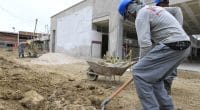Sustainable development, renewable energies, the blue economy, smart cities... More than ever, the Union of the Comoros wants to exploit its natural potential to develop its economy. This is the aim of the Comores Emerging Plan (PCE) for 2030, which is one of the priorities of Raheem Attoumane, the resident representative of the Representative Office of the African Association for Cultural Economics International (ACEI). For this official, the blue economy must be integrated into the PCE.
Sustainable development, renewable energies, the blue economy, smart cities… More than ever, the Union of the Comoros wants to exploit its natural potential to develop its economy. This is the aim of the Comores Emerging Plan (PCE) for 2030, which is one of the priorities of Raheem Attoumane, the resident representative of the Representative Office of the African Association for Cultural Economics International (ACEI). For this official, the blue economy must be integrated into the PCE.
Jean Marie Takouleu: What is the role of the African Association for Cultural Economics International (ACEI) vis-à-vis the government of the Union of the Comoros?
Raheem Attoumane: ACEI is an international non-governmental organisation (INGO) that helps to mobilise technical and financial partners to support the strategic plans of host countries, within the framework of headquarters agreements signed with their governments.
In the Union of the Comoros, we signed a headquarters agreement with the government on 26 August 2021, within the framework of its activities on the territory in accordance with Presidential Decree No. 20-101/PR of 30 July 2020 on the terms of accreditation and intervention of non-governmental organisations (NGOs) in the Union of the Comoros.
In accordance with the commitments made within the framework of the procedures and in compliance with the policies implemented by the government of the Union of the Comoros, we are contributing to efforts to promote and implement the six flagship projects of the Comoros Emerging Plan (PCE) for the 2030 horizon.
The implementation of the PCE is one of the Comorian government’s key ambitions. It aims for emergence by 2030. We are seven years away from that deadline. Where does the Union of the Comoros stand?
The Comoros Emerging Plan is a long-term economic and social development initiative. And its implementation requires efficient coordination and effective involvement. The government has set objectives and begun work in a number of sectors, including health, with the construction of a reference university hospital, road improvements, the fight against unemployment with direct support for financing youth and women’s entrepreneurship, the strengthening of institutions to fight corruption and improve the business climate. It should be noted that the implementation of the Comoros Emerging Plan requires the involvement of everyone to ensure its success and achieve the development goals set. We still have seven more years to make Comoros an emerging country. It is possible and it is achievable. This is why we are calling on all the players in our society and our development partners to redouble their efforts to continue implementing the flagship projects of the Comoros Emerging Plan.
According to the World Bank, the Union of the Comoros has an installed electricity capacity of 19.4 MW, most of which is produced from fossil fuels. Where does Comoros stand in terms of diversifying its electricity mix, given that its neighbours in the Indian Ocean, notably the Seychelles, are banking on solar energy, for example?
Like many island countries, Comoros relies mainly on imported energy sources such as fossil fuels to meet its energy needs. However, the government is undertaking various initiatives to diversify energy sources in order to reduce dependence on fossil fuels and promote sustainable development. The Foumbouni solar power plant in the Mbadjini region of Ngazidja has increased electricity generation capacity by 13.5%. The same initiative is being studied for replication in the Mitsamiouli region and other islands. The country is exploring the possibility of developing geothermal energy. This project, which is currently underway, will help to alleviate energy constraints and put our country on a sustainable development path.
One of the PCE’s key projects is the construction of a modern administrative and commercial district in the capital Moroni. What has become of this intelligent city project? What about its financing?
The aim of this structuring project is to strengthen the effectiveness and efficiency of information sharing by increasing communication and collaboration between government departments to make public administration more efficient and provide better services. This is one of the reasons why we have fiercely defended the participation of Comoros for the first time in the exhibition of the Committee of African Cities, to enable the ministries in charge of the flagship projects of the Comoros Emerging Plan to meet with their counterparts who have similar projects.
And it is our commitment to facilitate networking and mobilise technical partners for the six flagship projects of the Comoros Emerging Plan. We believe that Comoros’ participation in this event will be beneficial to the smart city project that is currently in the pipeline. The Committee of African Cities exhibition is an opportunity to learn from African experiences. It is also an opportunity to mobilise technical and financial partners and to present this flagship project to potential donors.
The Comoros has just hosted a ministerial conference on “The Blue Economy and Climate Action in Africa: Small Island Developing States (SIDS)”, which you recently attended in Moroni. What contribution can the blue economy make to the Comoros’ sustainable development objectives?
Our country is located in a strategic zone with great potential and many challenges. The fact that we are an island means that fishing and port activities are sectors with great potential for the sustainable development of the Comoros. The Moroni Declaration of 14 June 2023 for action on the ocean and climate in Africa stressed the need to put in place inclusive and sustainable blue economy development processes that encourage the development of small and medium-sized enterprises (SMEs), innovation and entrepreneurship.
The Blue Economy can contribute to food self-sufficiency and significantly promote economic growth by creating jobs and economic opportunities in the fishing, aquaculture, coastal tourism and shipping sectors. It can elevate our country to the rank of tourist destinations. This can help to reduce poverty and improve the living conditions of the populations of African island states. As stated in the Moroni Declaration, we have the potential to generate at least 2 million blue collar jobs that will benefit a minimum of 70 million people in island and coastal communities by 2030 in the Western Indian Ocean.
Other Indian Ocean states are focusing on eco-tourism, with fine sandy beaches and turquoise waters. These include the Seychelles and Zanzibar in Tanzania. We get the impression that Comoros is not being sold enough internationally. Why is that?
There are all kinds of tourism products available in the Comoros, including ecotourism, cultural tourism and agrotourism. Indeed, we are lagging behind our neighbours because our tourism is in an embryonic state in terms of infrastructure, training, visibility and tourist numbers. The high cost of flights is also an obstacle for our diaspora and for tourists.
The Comoros Development Partners Conference gave us an opportunity to look back and understand our tourism potential, so that we can make our country a first-class tourist destination, especially for tourists in search of nature.
The Comoros Emerging Plan describes tourism as one of its flagship projects for the emergence of Comoros by 2030. Initiatives are underway, including the construction of road infrastructure, hotels and airports, and the development and management of Karthala National Park.
The operationalisation of the National Tourist Office and the availability of the Special Fund for the Promotion and Development of Tourism will enable us to step up our efforts to make our tourism very attractive. Between January and April 2023, we welcomed two cruise ships to our ports. We remain confident that our country will soon be the new tourist hub of the Indian Ocean.
You will be taking part in the Committee of African Cities from 19 to 25 September 2023 in Paris, France. The event will address current issues facing cities, including access to water, waste management, energy and mobility, smart cities and digital infrastructure, training, technical assistance and financing. What is the purpose of the Comoros’ presence at the show?
This is the first time that Comoros has participated in this event. Our objective for this year’s event is to promote economic cooperation between state players and the Comorian private sector with other African and international players. It will be an opportunity to present the six flagship projects of the Comoros Emerging Plan in order to attract investors.
The aim is to enable Comorian representatives to establish and sign partnership agreements with other players.
We are also going to facilitate the twinning of a town in the Comoros with a town in the Otter Sea, to make it easier to share best practice between them, and to develop bilateral projects.
Interview by Jean Marie Takouleu






